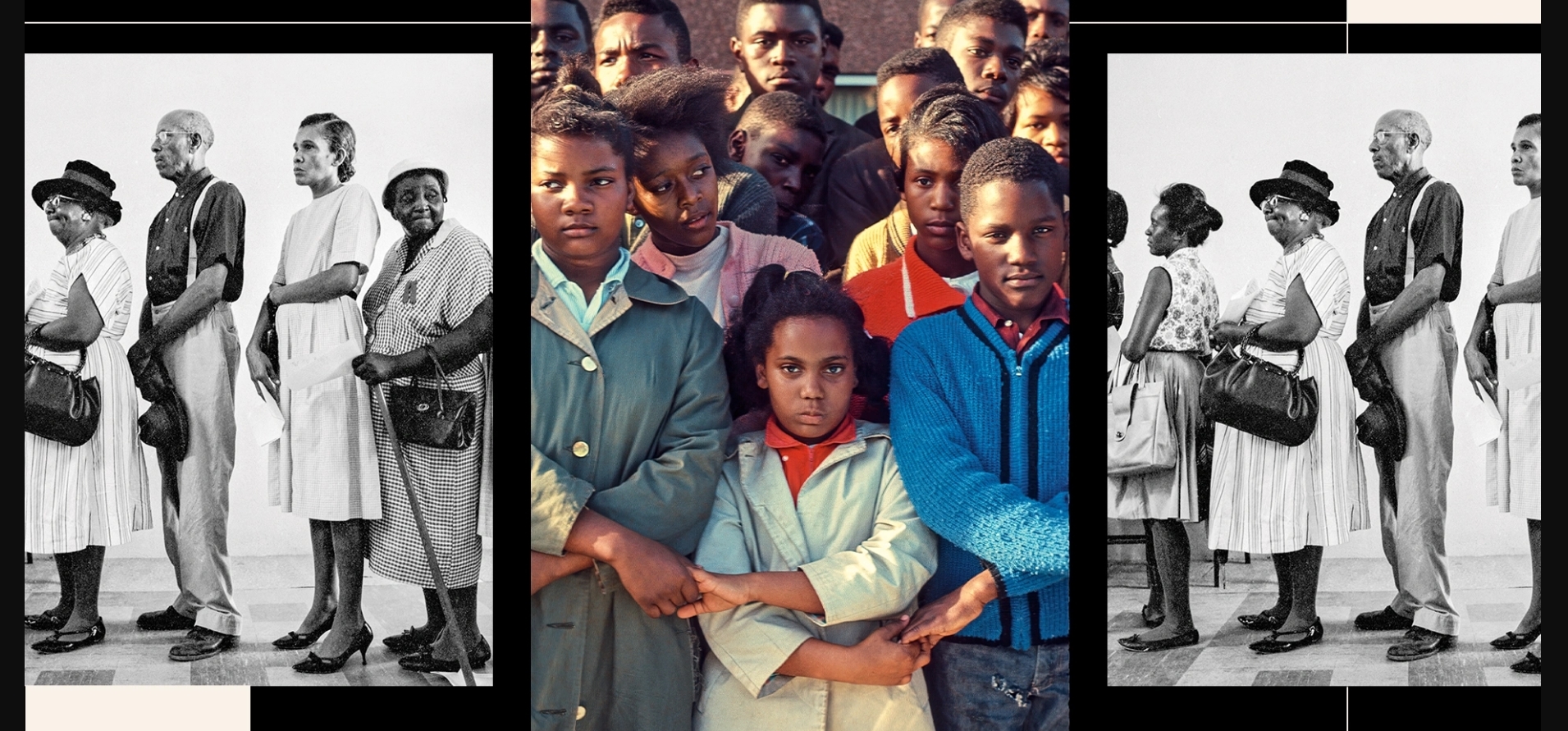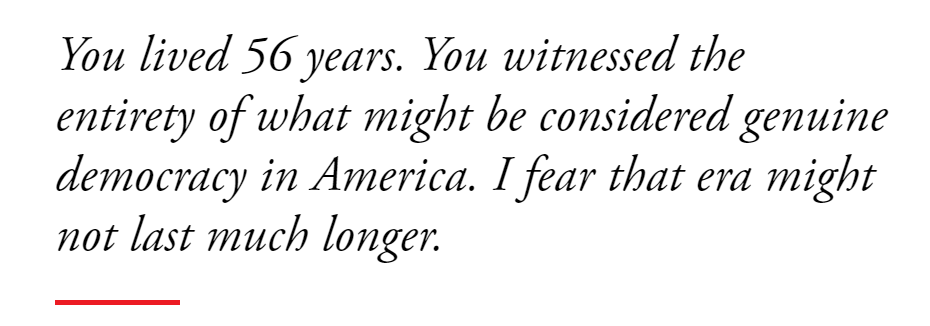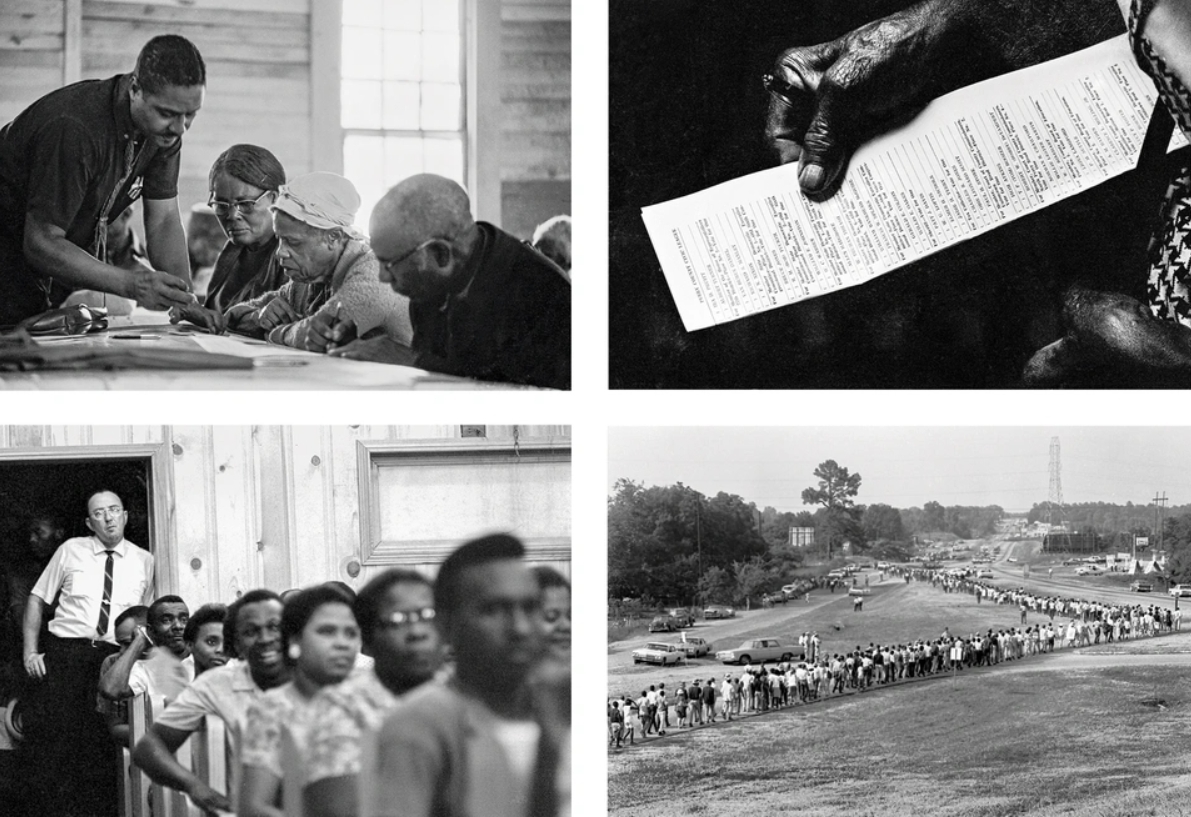Welcome to DU!
The truly grassroots left-of-center political community where regular people, not algorithms, drive the discussions and set the standards.
Join the community:
Create a free account
Support DU (and get rid of ads!):
Become a Star Member
Latest Breaking News
General Discussion
The DU Lounge
All Forums
Issue Forums
Culture Forums
Alliance Forums
Region Forums
Support Forums
Help & Search
General Discussion
Related: Editorials & Other Articles, Issue Forums, Alliance Forums, Region ForumsAmerican Democracy Is Only 55 Years Old--And Hanging by a Thread
Black civil-rights activists—and especially Black women—delivered on the promise of the Founding. Their victories are in peril.https://www.theatlantic.com/magazine/archive/2021/03/voting-rights-act-democracy/617792/

I. To My Mother
You were born on July 9, 1964, in Greenwood, Mississippi, delivered into the cradle of white supremacy. Listening to the stories of terror and hope woven into the story of your birth used to frighten me. The year before you entered the world, white supremacists were blocking food aid to Greenwood, trying to starve Black sharecroppers who were demanding their civil rights. You were carried home in the middle of Freedom Summer, right down the street from where Fannie Lou Hamer led a movement that included your neighbours and cousins to demand self-determination. You suckled and wailed, oblivious to your membership in the final group of Black babies born under Jim Crow. There were many such children, born just on the wrong edge of the fight for freedom. But only one of them was my mama. The marrow of your bones carried generations of struggle, and a year after your birth, that struggle helped bring forth something new. Acceding to the demands of your kin in Mississippi and of many others, President Lyndon B. Johnson and the white folks up in Washington passed the Voting Rights Act. The signing ceremony was in August 1965, just a month after your first birthday. Nobody knew exactly how the act would work, or what would happen when federal agents came down to the state to try to enforce it. But the local paper made things plain and simple: “President Signs Voting Law Declaring That Negroes Free.”
The VRA was historic legislation, but it was still an infant, vulnerable and soft. White leaders in Jackson and other state capitals across the South worked hard to stunt it. White supremacists found new ways to lean on and intimidate Black voters while scrambling to register poor white people. The cotton oligarchs took political offices in local districts and made them countywide offices, hoping to “dilute” new Black votes with white votes. They took other offices, traditionally elective, and made them appointed—then stocked them with white politicians. They gerrymandered districts to sequester Black voters together when it suited them, or to crack apart growing Black political bastions. But, slowly and painfully, the act cut its teeth. Black activists mobilized the people to seize the franchise. Examiners sent by Washington registered thousands of Black voters directly. Federal observers and Justice Department lawyers rooted out illegal disenfranchisement, often case by case and person by person. Black Mississippians dragged the state to federal court, over and over. I’ve got pictures of you in the 1970s, in frills and patent-leather dress shoes. You had the same smile in miniature, the smile I now recognize as my own. You had the same eyes, wide and alert, and the same hands, wiry and knobby. You and the Voting Rights Act grew up together. The VRA was extended by Congress in 1970 and then given new purpose and extended again in 1975, when its provisions were broadened beyond preventing Black disenfranchisement to cover non-English speakers.
In 1982, when you went off to college, in Coke-bottle glasses, Congress expanded the act’s coverage beyond purposeful, intentional bigotry to consider voting laws that had disparate, discriminatory effects—such as dilution—regardless of intent. The Supreme Court added to the arsenal with decisions that specified the VRA’s reach over redistricting and racial gerrymandering. The act became an integral part of the machinery of politics at every level in every state. There were growing pains. There always are. Voting-rights opponents poked and prodded, looking for areas where the courts and the Department of Justice were not so vigilant. They continued to fight any law that might make it easier to vote. As ever, Mississippi led the way. The state still made voters register separately for state and municipal elections, a holdover from the “Mississippi plan,” a strategy to deny African Americans the right to vote. When the Justice Department blocked a 1991 Mississippi redistricting scheme because it would have disenfranchised Black voters, a state representative told The New York Times that white politicians privately disparaged the remedy favoured by Black legislators as the “nigger plan.” Even as legislation, courts, and the Justice Department secured enormous increases in Black registration and turnout, racial gaps in both measures persisted. When I think about it all, I think about you, Mama. You had always wanted to be a teacher. You always were a teacher, the bright girl tutoring your siblings and cousins. But educating was more than a profession. Rather, it was halfway between divine purpose and civic duty, part of your drive to help set the world right—a drive I knew was connected to the circumstances of your birth and childhood.

That drive took you to North Carolina. You lived in a house with bad wiring and a bathroom not big enough to sneeze in, commuting 30 minutes across town every morning to teach at your school. You were 24 when you had me, your first child; American democracy, as I think of it, had just turned 23. Democracy is central to America’s idea of itself, but that idea had never been a reality until the VRA. You always reminded me of the precariousness and the novelty of this experiment—of the fact that I had been granted a franchise that wasn’t even yours when you were born. In school textbooks, the black-and-white photographs of civil-rights protests suggested that America had vanquished its demons ages ago. But you told me that the people marching in those photographs were the people who sang in the choir at church and who brought chitlins to family reunions. We were taught that Black folks had been granted a fundamental right in perpetuity, but in truth the boundaries and contours of that right were in flux and constantly being negotiated, renegotiated, and sometimes overruled. There were reauthorizations and court challenges, gerrymanders and consent decrees. But you were optimistic. So much of what I remember of you comes back to your faith in this country, and your steadiness in contributing to it. My own first time voting was in 2008, when Barack Obama was elected president. That was the night the spirit of the VRA came closest to being realized, perhaps. Black turnout was now eclipsing white turnout. I called you from college as you cried on your couch. You were 44, born dispossessed and disenfranchised in a county where only 250 Black adults out of more than 13,000 were registered to vote. It felt as if your own steadfastness had won out against every obstacle.
snip

great, long-form article
InfoView thread info, including edit history
TrashPut this thread in your Trash Can (My DU » Trash Can)
BookmarkAdd this thread to your Bookmarks (My DU » Bookmarks)
1 replies, 658 views
ShareGet links to this post and/or share on social media
AlertAlert this post for a rule violation
PowersThere are no powers you can use on this post
EditCannot edit other people's posts
ReplyReply to this post
EditCannot edit other people's posts
Rec (8)
ReplyReply to this post
1 replies
 = new reply since forum marked as read
Highlight:
NoneDon't highlight anything
5 newestHighlight 5 most recent replies
= new reply since forum marked as read
Highlight:
NoneDon't highlight anything
5 newestHighlight 5 most recent replies
American Democracy Is Only 55 Years Old--And Hanging by a Thread (Original Post)
Celerity
Feb 2021
OP
Turin_C3PO
(13,912 posts)1. That's an excellent article.
I’m glad I subscribed to the Atlantic last year. Their work is always high quality.